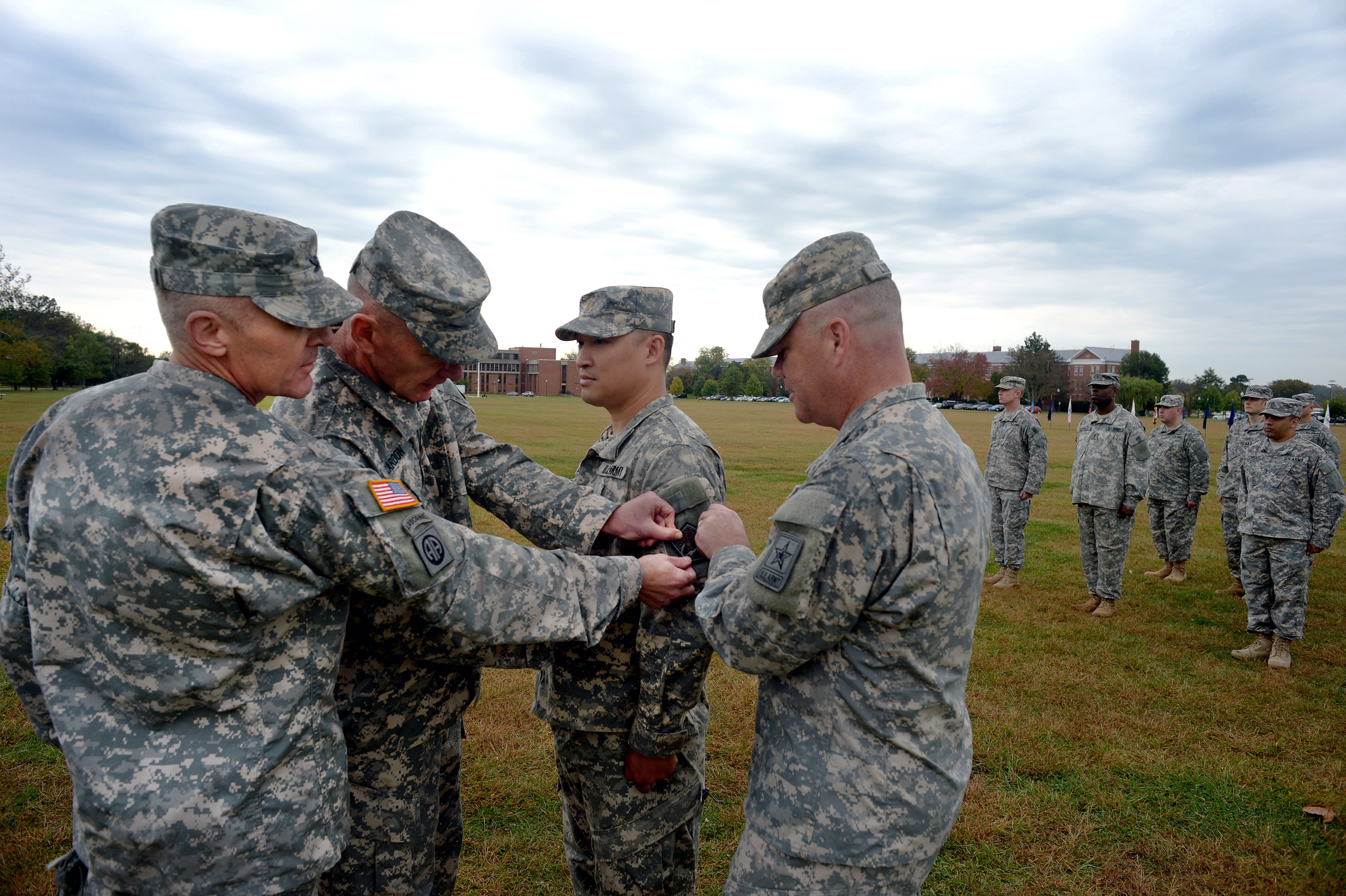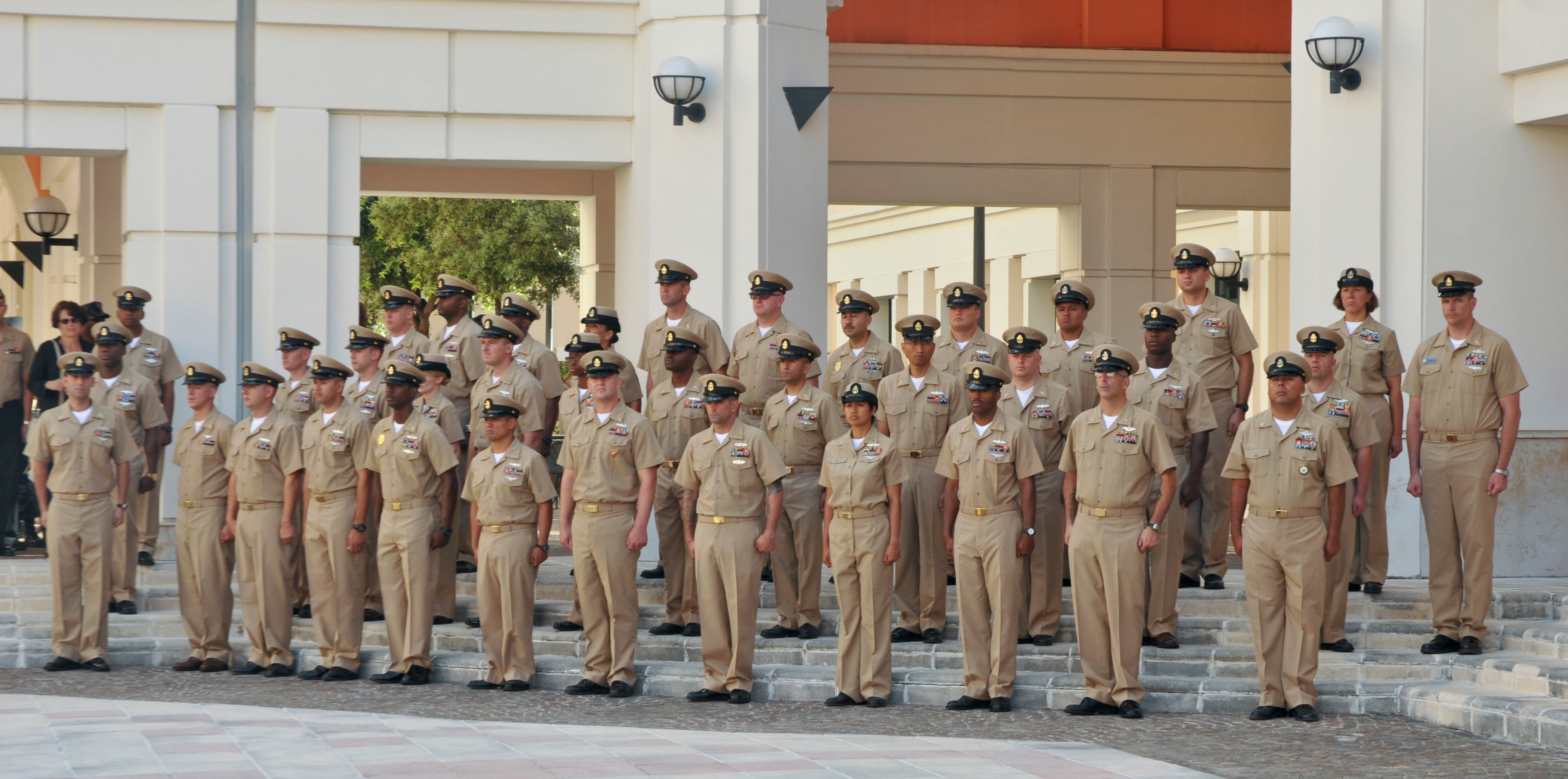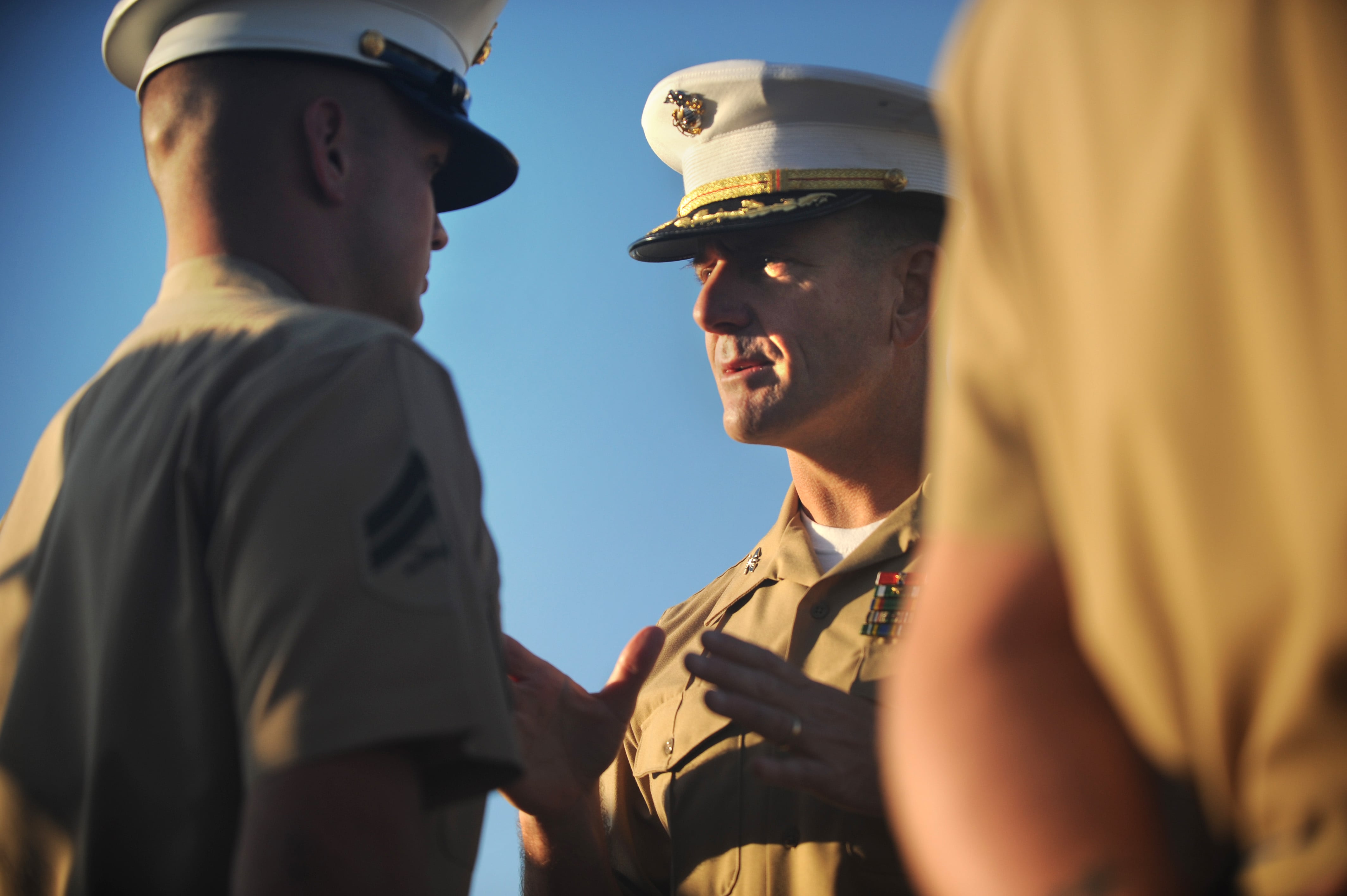Defense Secretary Ash Carter wants to open the door for more "lateral entry" into the military's upper ranks, clearing the way for lifelong civilians with vital skills and strong résumés to enter the officer corps as high as the O-6 paygrade.
The idea is controversial, to say the very least. For many in the rank-and-file military, it seems absurd, a bewildering cultural change that threatens to upend many assumptions about military life and traditional career paths. But while it's not universally embraced, there is interest in Congress and among some of the military's uniformed leaders — even, they say, in exploring how the services could apply this concept to the enlisted force.
Carter also is getting some support on Capitol Hill.
But for many in the rank-and-file military, Carter's proposal seems "ridiculous," a bewildering cultural change that threatens to upend many assumptions about military life and traditional careers.
This is It’s a key piece of Carter’s "Force of the Future" personnel reform. Unveiled on June 9, it aims to help be a way for the military Pentagon to bring in more top talent, especially for high-tech career fields focused on dealing with cyber warfare and space. Advocates say it will help the military fill important manpower shortfalls with highly skilled professionals and, more broadly, create greater "permeability" between the active-duty military and the civilian sector.
At the same time, But it also suggests eroding the military’s tradition of growing its own leaders and cultivating a force with a distinct culture and tight social fabric, which many believe to be is at the heart of the military’s effectiveness. Critics worry it will create a new subcaste of military service members who are fundamentally disconnected from the traditional career force.
"They will enter a culture they don’t know, understand or potentially appreciate," said Dakota Wood, a retired Marine officer and military expert at the Heritage Foundation. "The Marines around them will likely be challenged to appreciate them as they would a fellow Marine." Wood said.
If approved by Congress, the individual military services would be authorized — but not required — to expand lateral entry up to the O-6 paygrade, or the rank of colonel, or in the case of the Navy a captain. It's part of a broader reform effort that may also include new rules for bringing enlisted troops in at the noncommissioned officer ranks, which does not require any approval from Congress.
Yet the proposed change new accessions policy raises many cultural concerns and could result in a host of second-order effects. The services would have to tackle a range of questions. For instance, what kind of initial training will those officers undergo? Will lateral entry officers be eligible for promotion? Will junior officer retention be affected impacted by the prospect of potentially leaving and returning years later at a higher rank?
Cyber, principally, is driving the call for change, but lateral entry could extend to any high-demand career field with a robust civilian counterpart — logistics, for example, and military policing or public affairs. Those who work in such technical jobs often are lured away from the military's officer and enlisted ranks by high-paying jobs in the private sector. Offering personnel the opportunity to earn an O-6 salary — plus benefits — might alleviate that.
However, this raises another set of issues that'll need to be addressed. For instance, the military's current pay structure would offer significantly less to a colonel or a captain with one year of service versus one with 20 or more. And the military retirement system does not offer much in exchange for only short-term service.
The Navy is the most enthusiastic about Carter's proposal it. The Army and Air Force say they will consider high-level lateral entries if the change is it’s approved. And the Marine Corps appears to be the most skeptical of the change.
Carter acknowledged some concerns, saying and said it’s unlikely that lateral entry would affect impact the operational career fields that have little if any civilian counterpart, like the infantry, surface warfare or combat aviation. "Now, I have to say we can’t do this for every career field — far from it. It will probably never apply to line officers, as they’ll always need to begin their military careers as second lieutenants and ensigns," he Carter said. "But allowing the military services to commission a wider segment of specialized outside talent … will make us more effective." Carter said.
The individual military services would hammer out the details for themselves, which would involve more than just identifying the high-demand career fields and high-skilled recruits. They services would have to consider how candidates for lateral entry will adapt to service-specific military life.
"There are some cultural issues," said Brad Carson, the Pentagon’s former personnel chief who helped draw up the ambitious slate of personnel reforms. "People who come in won’t just have to have the skills. They’ll have to have a military bearing and understand the military ethic. You don’t just get that by walking in off the street." Carson said.
But what if Mark Zuckerberg, the inventor and CEO of Facebook, wanted to join the military? Carson Cater cites this hypothetical to illustrate the rigidity of today’s personnel system.

Facebook CEO Mark Zuckerberg delivers the keynote address at the F8 Facebook Developer Conference April 12, 2016, in San Francisco.
Photo Credit: Eric Risberg/AP
While Zuckerberg's skills would likely be profoundly valuable to U.S. Cyber Command, the 32-year-old computer programmer dropped out of Harvard and has no bachelor's degree, making him ineligible for commission as an officer. A military recruiter could probably find some ways to grant him credit for the skills and experience evident in his self-made fortune — estimated to be $51 billion — but not much.
"If Mark Zuckerberg decided that he wants to serve his county in the military, we could probably make him an E-4 at cyber command," Carson said. "Corporal Zuckerberg. We think we should have the ability to bring him in at whatever rank the military service thinks he'd be effective."
First cyber. Then what?
Even the suggestion of directly commissioning civilians as into full-bird colonels or Navy captains — a rank many career officers never attain — make -- reflects the degree of high-level concern surrounding about the efforts underway to build out CYBERCOM. Created in 2010, the command is trying to stand up a cyber-mission force of 6,200 active-duty specialists organized in 133 teams.
But progress has been slower than hoped, however. The target date for standing up those teams was the end of 2016, but that deadline has been pushed out to 2018. So far, about half of those teams, 68, have reached what the military calls "initial operational capability," and as many as 100 teams are currently conducting missions to meet the demand for offensive and defensive cyber capabilities, defense officials say.
Some military officials fear that the demand for cyber operations is such that soaring and there’s not enough time for the services to "grow their own" cyber force from the ground up. Under the military's traditional personnel system, it might take more than a decade to cultivate the cyber capability that the Pentagon needs, some military officials say.
Currently, by Under current laws, the Pentagon is options for lateral entry are mostly limited to use lateral entry for chaplains, lawyers, doctors and dentists, and even for those career specialties, lateral entry is capped at the O-4 paygrade, or the rank of major and, in the case of the Navy, lieutenant commander.
A Senate’s proposal would give the defense secretary authority to expand lateral entry to any career field and raise the rank cap up to the O-6 paygrade. Current law limits lateral entry commissions to doctors, dentists and lawyers and caps their entry point at O-4, a major or in the case of the Navy a lieutenant commander. The law already For enlisted troops, current law allows the services to grant lateral entry to enlisted troops, and some in the Pentagon want officials are considering changing policies to expand that authority.
Critics question the need for high-level lateral entry and suggest civilians or contractors could fill gaps in skills for those high-tech fields. But Pentagon officials say there are key reasons why pinning a full bird the collar of a lifelong civilian is a good idea.
For starters, it bestows legal protections as a full-fledged combatant, which has implications that range from ensuring prisoner-of-war status under international law to immunity from prosecution in court. "You'd want them to have 'Law of War' protection if you know what they are doing is having a kinetic effect," Carson said.

Basics, such as how to wear a uniform or knowing whom to salute, could prove confounding for midcareer civilians wooed into military service, critics of the plan argue.
Photo Credit: Sgt. 1st Class Jon Soucy/Army
Another concern is the actual level of interest among civilians. Many successful midcareer professionals have families and earning potential beyond what the military could offer.
"I really question who is going to do it," said Richard Bejtlich, a 44-year-old Air Force Academy graduate who separated when he was a junior officer and is now a cyber-security expert with FireEye and the Brookings Institution, a think tank in Washington. "I don’t see a lot of people I know of saying, ‘Hey, I want to go abandon my current position and go be in the military.' " Bejtlich said.
Ultimately, those People with prior military experience might ultimately be the best candidates for lateral entry because they are familiar with military culture, and would acclimate and find acceptance far more quickly.
"Can you imagine someone coming in as an O-5 or O-6 and not knowing who salutes who? Or how to wear a uniform?" Bejtlich said. "The traditional military’s worst nightmare is to bring in some long-haired hippie and make him a colonel." Bajtlich said. The way I think you could make it palatable to the rank and file is, you would limit it to bringing in former military."
Whether the authority for lateral entry is widely used will likely vary — significantly — by service.
The Navy
The Navy, has pushed for expanded lateral entry more aggressively than any of the other services, has pushed aggressively to expand lateral entry. Navy officials say it will help fill critical needs in existing career fields — but also to build new capability quickly fast in the event of a full-scale war.
"Right now the one we’re focused on is the cyber [community] because that’s the immediate need," said Vice Adm. Robert Burke, the chief of naval personnel. "But we want this authority in place ... because we want to be responsive when the need comes — we don’t want to start writing policy the minute we discover we need it." Burke said.
The Navy has no detailed plans for lateral entry at the moment. Should Congress give its their nod of approval, — sources tell Military Navy Times that the service — they could implement new rules and begin commissioning civilians into the upper ranks sometime in fiscal 2017, which begins in October.
"Today, cyber is where we need it; tomorrow we might need it in 10 other places," he said "I just can't foresee what those might be right now."

Newly promoted chief petty officers stand at attention during their pinning ceremony in Naples Italy in 2013.
Photo Credit: Mass Communication Specialist 2nd Class Corey Hensley/Navy
The Navy is also considering more lateral entry for the enlisted force. Legally, that’s easy and, unlike for officers, requires no congressional approval. But culturally, the Navy could may struggle to integrate newly minted chief petty officers brought in at the E-7 paygrade.
Shortly after then Rear Adm. Burke broached the subject publicly told a panel at the annual Sea-Air and Space Symposium in mid-May, at the annual Sea-Air Space Symposium in Washington. Feedback from the fleet was about plans to expand lateral commissions, Navy Times got an immediate. One and swift reaction from some chief petty officers, including a chief aviation electronics technician stationed at North Island in California, called the suggestion "ridiculous who asked not to be identified by name."
"For Rear Adm. Burke to suggest creating push button CPOs is ridiculous," the sailor wrote. "He states that he is ‘seeking the authority to bring somebody in at the E-7 level,’ " the sailor said, asking for anonymity to speak freely. "I find the choice of words interesting. Notice he doesn't say they want to bring someone in at the CPO level. There's only one entity that selects, tests and accepts chief petty officers. That's the United States Navy Chief Petty Officers Mess. Anything else is an E-7."
"They're talking about cheapening the CPO brand. They're talking about creating counterfeit chiefs."
The Army
Army leadership also has been quick to endorse Carter's "Force of the Future" ideas, to include lateral entry — primarily as a way to shore up readiness.
"It gives secretaries of the services the authorities to use those tools that are needed," Army Vice Chief Gen. Daniel Allyn told a crowd at the Heritage Foundation on June 13. "That's important. You want to have a toolbox that allows you to adjust as needed."
Army officials acknowledged that for some select skill sets, the proposals would be "very beneficial" for readiness, and the Army is looking into how best to apply those initiatives if the military receives the congressional authority Carter is seeking.
"We have expertise in America that could serve the military well, but we don't have the apparatus to bring someone in," said one Army official, who asked not to be identified. "Cyber is one of the key components of that. It's so new in so many different ways. ... We're coming to a place and time where we're dealing with the cutting edge of many different issues."
The Army already uses the current lateral entry authorizations to bring in medical personnel, chaplains and, to some degree, lawyers. Most come in as captains or majors. Officials The Army will opt for a limited use of any new lateral entry authorities. "It won’t be a blanket approach, and it shouldn’t be," the Army official said. "Some of this doesn’t apply to all branches and specialties."
The Army tapped its existing lateral entry authority used during the height of the Iraq war to help meet the soaring demand for trauma surgeons, the Army official said.
Lateral entry will allow the Army to respond more quickly to emerging demands, said Retired Lt. Gen. Guy Swan, a retired three-star general who is the vice president for education at the Association of the United States Army. "You may have readiness needs that are needed today," he said. "And certainly the Army could grow its own people, but it may not have the time."
Swan said a good use of lateral-entry may be in the reserves. Reservists can "continue to hone their skills at Google or Microsoft and we can leverage those skills as needed," he said. But he expects some pushback from the rank-and-file, at least initially.

Military reservists whose civilian jobs are in Silicon Valley may be the ideal candidates for lateral entry into the cyber field, one Army observer says.
Photo Credit: Paul Sakuma/AP
"It'll probably take some additional explanation," he said. "I think a large majority of the Army would never even see this. It would never affect their lives. You're talking about narrow skill-sets that are niche capabilities."
Swan likened these lateral-entry recruits to warrant officers, which raises a question: Should these lateral entry soldiers be brought on as warrants, officers or noncommissioned officers? This is what the service needs to determine, Swan said, adding that they could also be brought in as civilian federal employees.
The Army has the power to extend lateral entry to some traditional hard-to-fill jobs in its NCO corps. But what jobs would they fill? The Army has had trouble in recent years placing sergeants and staff sergeants in highly technical jobs such as: MOS 25D (cyber network defender), 29E (electronic warfare specialist), 12P (prime power production specialist) 25E (electromagnetic spectrum manager). Qualifications also remain high for NCOs looking to go 35L (counterintelligence agent).
The Air Force
The Air Force is open to the idea of expanding lateral entries, particularly for people with cyber skills. "We're still exploring it," Brig. Gen. Brian Kelly, director of military force management policy, said during an interview in May. "We are looking at similar programs to what the Navy is talking about."
An Air Force spokeswoman at the Pentagon added that lateral entries could have a positive impact on the culture. "We certainly see opportunity to create the kind of 'ventilation' and influx of ideas and talents that the secretary of defense has previously discussed," Capt. Brooke Brzozowske wrote in a statement to Military Times.
Besides hackers or other cyber experts, the Air Force could benefit from bringing in midcareer people to serve as enlisted airborne cryptologic language analysts, said Terry Stevens, a retired Air Force colonel and personnel expert. Those language analysts are regularly on the Air Force’s list of the most stressed specialties, and to retain airmen in that field, the Air Force offers selective re-enlistment bonuses that can be worth tens of thousands of dollars. The latest list offered hefty re-up bonuses to specialists who speak Arabic, Chinese, Korean, Russian, Spanish, Persian, Hebrew or Pashto.
Some jobs in the Air Force are similar to those in the civilian aviation sector, so the Air Force could potentially bring on midcareer airmen with experience maintaining private sector aircraft, Stevens said.
The Air Force has regularly sounded the alarm about undermanning in career fields such as cyber, intelligence and maintenance, and adopted a slate of recruitment and retention incentives and strategies to bolster those positions. But officials the Air Force would need to be careful how they bring on these new airmen, Stevens said. He said the service shouldn’t bring anyone into a rank higher than major, to avoid putting anyone in a leadership position who doesn’t have experience with the military, its culture and its processes.
"They have absolutely no military background, they don't know how the systems work, they don't know how to supervise military personnel," Stevens said. Such a move would "create a lot of animosity, confusion and distrust" on the part of the existing officer corps.
If the Air Force needs someone's skills badly enough to make them an O-6, Stevens said, it should instead hire them as a civilian at, for example, the GS-15 grade.
The Marine Corps
The Marine Corps might be the most skeptical among the four services.
A Marine personnel officer said the service's leaders support the proposal in part because of its "flexibility" and the fact it does not force the services to change their policies. "We are prepared to observe the 'experimentation' efforts of other services and adopt the best practices where applicable and advantageous," said Col. Gaines Ward, head of the service's promotions and policy branch.

Marine Corps leaders, while supportive of the flexibility Carter's plan would provide, fear the cultural rifts it could create within a service that fosters tradition and uniformity more so than the others.
Photo Credit: Marine Corps
Hiring a top-notch "cyber-warrior" at an elevated pay grade and having them give or take orders from a Marine with years of time in service would create a culture clash quite different from than what you’d see at a Silicon Valley start-up, said Wood, the retired Marine officer at the Heritage Foundation. It’s that prospect of tension that concerns leaders at the Marine Corps' highest levels.
When Gen. Robert Neller became the service's 37th commandant last September, he immediately realized the need to bring top cyber talent into the force, but was concerned about maintaining recruiting standards, Brig. Gen. Loretta Reynolds, commander of Marine Forces Cyber Command, said during her remarks a recent conference in Washington.
"Do I have to start letting guys with purple hair and earrings in?" she recalled Neller asking.
The answer: No.
"You can let them in with purple hair but we're going to shave it off anyways and plug up whatever holes they have if they're smart enough," Reynolds added.
The feasibility of direct accessions for the Marine Corps may also depend on the environment in which any lateral-entry personnel operate. Working in a stateside garrison environment may not be very different than from having contractors fill these critical positions, but it would be a completely different thing in a combat environment, Wood said.
"If lateral-entry civilians actually become serving, uniformed and ranked 'Marines,' then I think their fellow 'normal' Marines would expect them to operate just as any Marine would," he said. "Not having the years of growing up in the Corps, however, this might be a difficult transition for some to make, especially in combat situations."
'Cpl. Zuckerberg'
What if Mark Zuckerberg, the inventor and CEO of Facebook, wanted to join the military? It's a hypothetical often cited by Carson, the former Pentagon personnel chief, to illustrate the rigidity of today's personnel system.
While Zuckerberg's skills would likely be profoundly valuable to CYBERCOM, the 32-year-old computer programmer dropped out of Harvard and has no bachelor's degree, making him ineligible for commission as an officer.
A military recruiter could probably find some ways to grant him credit for the skills and experience evident his self-made fortune estimated to be $51 billion. But not much.
"If Mark Zuckerberg decided that he wants to serve his county in the military, we could probably make him an E-4 at cyber command," Carson said. "Cpl. Zuckerberg. We think we should have the ability to bring him in at whatever rank the military service thinks he'd be effective."
Tilghman is Military Times' Pentagon bureau chief. Staff writers Mark Faram, Stephen Losey, Matthew L. Schehl and Michelle Tan contributed to this report.
Andrew Tilghman is the executive editor for Military Times. He is a former Military Times Pentagon reporter and served as a Middle East correspondent for the Stars and Stripes. Before covering the military, he worked as a reporter for the Houston Chronicle in Texas, the Albany Times Union in New York and The Associated Press in Milwaukee.





